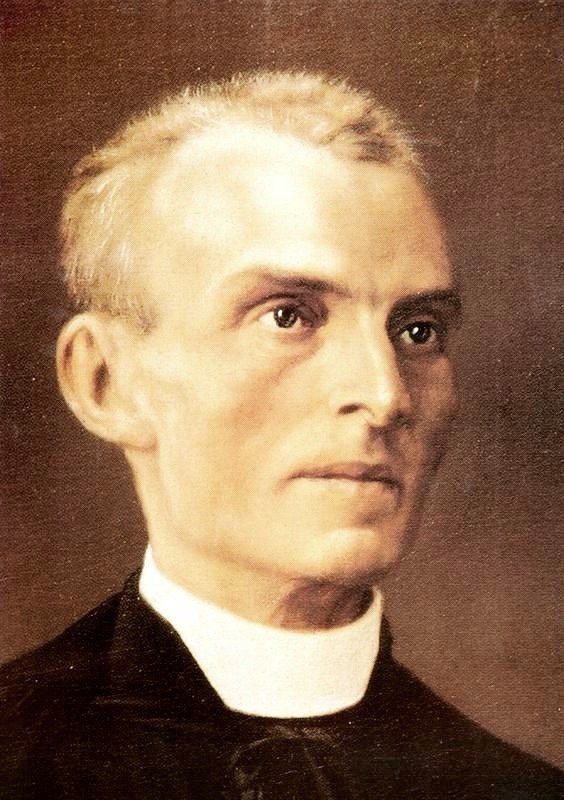PROPER OF SAINTS OF THE ROMAN MISSAL

August 2
SAINT PETER JULIAN EYMARD
Priest
Founder of the Congregation of the Blessed Sacrament
and of the Servants of the Blessed Sacrament
From the Common of Pastors, or Religious
OPENING PRAYER
O God
You filled Saint Peter Julian with wondrous love
for the mysteries of the Body and Blood of Your Son.
Grant, we beseech You, that like him,
we may experience the richness of this holy banquet.
Grant this through our Lord Jesus Christ…
LITURGY OF THE WORD
First Reading: Acts 4:32-35. They were of one mind and heart
Psalm Response: Psalm 33:2-3, 4-5, 6-7, 8-9, 10-11. Taste and see the goodness of the Lord
Alleluia: John 15:4a, 5b. Abide in me and I in you, says the Lord; the one who abides in me will bear much fruit.
Gospel: John 15: 1-8. The one who abides in me will bear much fruit.
PROPER OF THE SAINTS: LITURGY OF THE HOURS
August 2
SAINT PETER JULIAN EYMARD
Priest
He was born in the town of La Mure, France in the year 1811. Ordained a priest and engaged in pastoral work for some time, he later entered the Society of Mary. Fervent disciple of the Eucharistic mystery, he established two congregations, one for men, the other for women, dedicated to the worship of the Eucharist. He was also the initiator of many other apostolates, aptly chosen to arouse love for the Holy Eucharist among the faithful. He died on August 1, 1868 in the town in which he was born.
From the common of pastors or religious
FOR THE OFFICE OF READINGS
SECOND READING
From the writings of Saint Peter Julian Eymard, priest
(La Présence réelle, vol. I, Paris, 1950, pp. 270-271 and 307-308).
Eucharist: sacrament of life
The Eucharist is the life of the people. The Eucharist gives them a centre of life. All can come together without the barriers of race or language in order to celebrate the feast days of the Church. It gives them a law of life, that of charity, of which it is the source; thus it forges between them a common bond, a Christian kinship. All eat the same bread, all are table companions of Jesus Christ who supernaturally creates among them a feeling of togetherness. Read the Acts of the Apostles. It states that the whole community of the first Christians, converted Jews and baptized pagans, belonging to different regions, “had but one heart and one soul” (Acts 4, 32). Why? Because they were attentive to the teaching of the Apostles and faithful in sharing in the breaking of the bread (Acts 2, 42). Yes, the Eucharist is the life of souls and of societies, just as the sun is the life of the body and of the earth. Without the sun, the earth would be sterile, it is the sun which makes it fertile, renders it beautiful and rich; it is the sun which provides agility, strength and beauty to the body. In the face of these amazing effects, it is not astonishing that the pagans should have adored it as the god of the world. In actual fact, the sun obeys a supreme Sun, the divine Word, Jesus Christ, who illumines everyone coming into this world and who, through the Eucharist, Sacrament of life, acts in person in the very depths of souls in order to form Christian families and peoples. Oh how happy, a thousand times happy, is the faithful soul who has found this hidden treasure, who goes to drink at this fountain of living water, who eats often this Bread of eternal life! Christian society is also a family. The link between its members is Jesus Christ. He is the head of the household who has prepared the family table. He is the head, Jesus Christ, who celebrated christian togetherness at the Supper; he called his Apostles filioli, my little children, and he commanded them to love one another as he had loved them. At the holy table we are all children who receive the same nourishment, and Saint Paul draws out the consequence of this, that is, that we form but one family, one same body, because we all share in the same bread, which is Jesus Christ (1 Cor. 10, 16-17). Lastly, the Eucharist gives Christian society the strength to observe the law of honour, and to practice charity towards one’s neighbour. Jesus Christ wants everyone to honour and love his brothers and sisters. For this reason he identifies himself with them: "What you do to the least of mine, you do to me" (Mt. 25, 40); and he gives himself to each one of them in Communion.
RESPONSORIAL Cf. 1 Cor 10:17; Jn 6:58a
R/. Because there is one bread, we who are many are one body, for we all partake of the one bread.
* This is the bread which came down from heaven.
V/. The Lord has nourished us with this rich food.
* This is the bread.
PRAYER
O God,
You filled Saint Peter Julian with wondrous love
for the mysteries of the Body and Blood of Your Son.
Grant, we beseech You, that like him,
we may experience the richness of this holy banquet.
Grant this through our Lord Jesus Christ…
Decree of the Congregation for the Sacraments and Divine Worship
Rome, 9th day of December 1995
